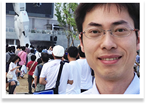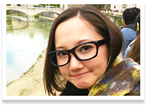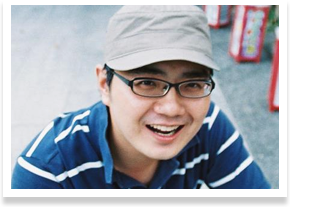
Wang Wenyi
Currently engaged in sales for a Japanese human resources services company that conducts staffing and recruiting
Graduated from the School of Commerce, Meiji University in 2009
In what industry and in what kind of work are you currently engaged?
After graduating from Meiji University, I have been working in sales for a Japanese human resources services company that conducts staffing and recruiting for corporations.
A human resources services company works between hiring companies and job seekers to identify the needs of both parties and achieve placement that meet the requests of both parties. I especially put efforts into hiring of non-Japanese nationals and job search support for students from abroad, making use of my own experiences.
A human resources services company works between hiring companies and job seekers to identify the needs of both parties and achieve placement that meet the requests of both parties. I especially put efforts into hiring of non-Japanese nationals and job search support for students from abroad, making use of my own experiences.
What is the reason you chose this job?
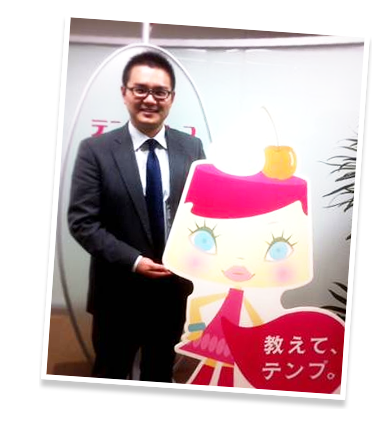
I want to quickly grow as a businessperson. The answer I came up with to meet that goal is to be involved in sales. The reason is that sales is the way to understanding how people, goods, and money flow, because salespeople stand at the front lines and see that flow firsthand, actually setting them in motion. So, I believed that sales would be the way to get a running start on my own growth.
I want to work with people. I particularly want to provide the knowledge and wisdom I gained from my experience studying in Japan to contribute in some way to people from abroad looking for employment in Japan. I came to that idea when giving guidance counseling on education paths at the Japanese language school. By providing the knowhow I gained while studying abroad, I had the opportunity to help students who came after me to solve the issues they faced and achieve their goals, so I felt a sense of fulfillment in career development work.
When do you feel your job is worthwhile?
That would be when job seekers I had supported in their career search land the job they were looking for or when client companies actually decide to hire the best candidate I introduced them to. But more than that, I feel fulfillment when both parties say, “Thank you. You really helped.”
What do you think is important in doing your job?
There are more things important in work involving people than can be counted. But two things that I think stand out as being of particular importance.
The first is “listening to what the other person has to say.”
This is harder to do than to say, however. Some people are self-centered or make unreasonable demands. But, I believe that you can make out what the other party is trying to say by patiently listening closely without giving up.
The second is “supplement with actions the deficiencies of words alone.”
Complaints are unavoidable in any job. Of course, it would be better to prevent them from occurring in the first place, but what really matters are actions taken after complaints occur. I believe that with actions taken upon seriously thinking of the other party, the results achieved and the impression given to the other party will be completely different. I constantly strive to compliment with actions that cannot be conveyed by words alone.
The first is “listening to what the other person has to say.”
This is harder to do than to say, however. Some people are self-centered or make unreasonable demands. But, I believe that you can make out what the other party is trying to say by patiently listening closely without giving up.
The second is “supplement with actions the deficiencies of words alone.”
Complaints are unavoidable in any job. Of course, it would be better to prevent them from occurring in the first place, but what really matters are actions taken after complaints occur. I believe that with actions taken upon seriously thinking of the other party, the results achieved and the impression given to the other party will be completely different. I constantly strive to compliment with actions that cannot be conveyed by words alone.
Going forward, what kind of career do you want to establish?
In the future, I would like to become a professional in human resources, education, and organizations. After turning 50, I would like to hold lectures at universities or other educational venues, making use of the knowledge and wisdom gained up to that point.
What did you find difficult in job-hunting in Japan?
Many things were difficult, but the most difficult things were expressing myself in Japanese and dealing with the application form, written test and online test where I was expected to answer questions upon accurately interpreting Japanese.
Many Japanese companies require that the application form be filled in Japanese. As I had studied in Japan, I had acquired a level of Japanese where I could converse with friends without any trouble, but I did not have writing skills of a level expected in writing official documents to be submitted to a company. I often did not know how to write to express myself, making it a painstaking task.
On the written and online tests, international students are expected to compete on the same field as Japanese students (in terms of answer time and questions).
Unfamiliar expressions appear on tests, so many of my international student friends did not pass these tests.
Many Japanese companies require that the application form be filled in Japanese. As I had studied in Japan, I had acquired a level of Japanese where I could converse with friends without any trouble, but I did not have writing skills of a level expected in writing official documents to be submitted to a company. I often did not know how to write to express myself, making it a painstaking task.
On the written and online tests, international students are expected to compete on the same field as Japanese students (in terms of answer time and questions).
Unfamiliar expressions appear on tests, so many of my international student friends did not pass these tests.
How did you overcome your difficulties?
For the application forms, I prepared multiple patterns while looking at reference books and had the staff at the Employment / Career Support Office correct them. I repeated this task many times.
For written tests and online tests, I bought about 15 reference books, looking those over many times so that I could answer as many questions as possible.
For written tests and online tests, I bought about 15 reference books, looking those over many times so that I could answer as many questions as possible.
What were you engrossed in during your student days?
And what triggered your enthusiasm for it?
And what triggered your enthusiasm for it?
I was really involved in guidance counseling on education paths of students at the Japanese language school I had attended. Many of those whom I counseled entered Meiji University, and many of them went to work for Japanese companies. Just like me, they run into various obstacles of culture and language, and I still give them advice today. It gives me a good feeling when they say, “I have come to understand what you meant at that time.”
How do you think you have changed before and after studying abroad?
I changed dramatically. You could even say my entire life has changed. I came to Japan in the first place because I wanted to change my life, so I think everything about me has changed. But there are two points in particular that changed.
The first is “self-confidence.” I gained self-confidence by living in a different country by my own abilities.
The second is “zest for living.” There will always be difficulties and obstacles to overcome in life. But the only way to overcome those is to take action. I believe I was able to gain the ability to take such action.
The first is “self-confidence.” I gained self-confidence by living in a different country by my own abilities.
The second is “zest for living.” There will always be difficulties and obstacles to overcome in life. But the only way to overcome those is to take action. I believe I was able to gain the ability to take such action.
What did you have difficulty with during your study abroad?
There were many things. But fortunately they are just memories now. I can think back on them now not as it being tough. Rather, I think of them simply as being episodes that happened or being something that was nostalgic or fun.
Which of your memories of your student days at Meiji University stands out the most?
The memory which stands out the most was the generous support for students from abroad. The best example of that is the International Lounges. The International Lounges set up at each campus are used as study places to prepare for and review lessons, and I used to spend long hours. There I was able to meet many people, Japanese as well as international students. Many of the people I still keep in contact with today and get together with are who I first met at the International Lounge.
The next memory which stands out the most is job search support events held for international students. There are broad-ranging programs to support international students in their job search, almost like being a full-course meal. As far as I know, Meiji University has the best support system of all the universities in Japan.
Working as a human resources coordinator now, I can get an ever better feel of how substantial Meiji University’s job search support for international students is. I would like much more current and potential international students to know about this generous support.
The next memory which stands out the most is job search support events held for international students. There are broad-ranging programs to support international students in their job search, almost like being a full-course meal. As far as I know, Meiji University has the best support system of all the universities in Japan.
Working as a human resources coordinator now, I can get an ever better feel of how substantial Meiji University’s job search support for international students is. I would like much more current and potential international students to know about this generous support.
Which class at Meiji University left the biggest impression on you?
That would have to be the Japanese language classes. Of those, professor Noriko Kurosaki’s intensive Japanese reading class left me with the most lasting impression. I had a degree of confidence in my Japanese language ability before taking that class, but I was able to further my abilities even more thanks to professor Kurosaki’s appropriate advice. The things that professor Kurosaki taught me are the foundation upon which I do my work today.
Of the things you learned at Meiji University, what do you find most useful in your current job?
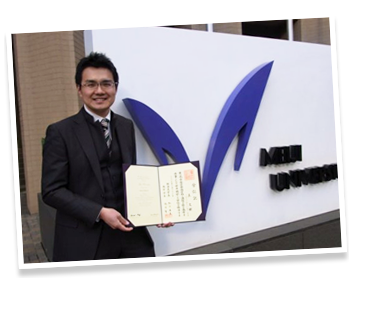
First is Japanese language. Japanese is the foundation for everything a foreigner does in his or her job in Japan. But this is more than just learning correct grammar and a rich vocabulary. I think advanced Japanese language ability also involves choosing your words while observing the people you are talking to and choosing convincing words they would accept rather than trying to prevail over them.
The second is bookkeeping and financial analysis. I work in corporate sales, so financial statements are the best material for judging the financial condition of the companies we do business with. It is thus very important that I learned to read those.
The third is understanding of Japanese organizations and decision-making processes. By actively participating in seminars and classes, I was able to learn a lot about those.
Was there sufficient support from Meiji University for international students?
Yes, there was. There was nothing lacking at all, and I am very grateful for the support. I would like for many international students and potential students from abroad to know of the substantial support and make use of when studying at Meiji University.
Please give a message for students all over the world who are considering studying at Meiji University.
I was able to greatly change myself by studying at Meiji University. I believe that the basic philosophy of Meiji University, “To the world, Empower the Individual, Link to the World, and the Future,” has been thoroughly taken up by students of Meiji University.
I really, really, encourage you to go to Meiji University, empowering your individuality and going out into the world!
I really, really, encourage you to go to Meiji University, empowering your individuality and going out into the world!
Also Read:


